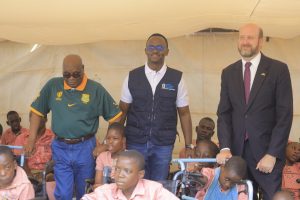As Uganda joined the rest of the world to commemorate Nelson Mandela International Day on July 18, Ugandans were urged to honor the iconic statesman’s legacy by offering tangible support to those in need especially children with disabilities.
This year’s national celebration was held at Kampala School for the Physically Handicapped (KSPH) in Mengo and organized by the Mandela Washington Fellowship Alumni Network Uganda.
Themed “It is still in your hands” the International day celebration served as both a reminder and a challenge to act in the spirit of Mandela’s values: dignity, compassion, and service. 
In an emotional address, Ambassador Solly Mbola, South Africa’s chargé d’affaires to Uganda, made a passionate plea for collective responsibility in fighting poverty, inequality, and exclusion.
“Ubuntu means ‘I am because you are,’” he said. “It’s not about how long you live, but what impact you make while living. If you see a child in need, adopt one. Pay their school fees. Give them a smile. Give them a future. That is how we honor Madiba.”
He added, “Mandela loved children. He believed in lifting the marginalized. It is still in our hands to roll back poverty and inequality, especially for children like those we see here today.”
U.S. Ambassador to Uganda, William Popp, lauded the Mandela Washington Fellowship alumni for leading a life of service inspired by Mandela’s principles. He emphasized that the day’s gathering was not just symbolic, but a call to action.
“Hope takes the shape of children learning to read. It is built in classrooms, and in the hearts of those who refuse to let these children dream alone,” Ambassador Popp said.
“Let us build ramps instead of barriers. When we do that, we’re not just helping a child walk into a classroom we’re helping them walk into their future,” he added.
He praised the school’s teachers and caregivers for their relentless efforts and highlighted the power of collaborative service.
“Building a future, especially one built on dignity, is a shared endeavor. And this celebration proves that together, we can achieve more,” Popp said.
To support the school, the Mandela Washington Fellowship Alumni Network ran a month-long campaign to raise UGX 100 million for the Accessibility Fund, aimed at improving infrastructure and scholastic resources for the learners. According to Don Patrick Bugingo, President of the alumni network, the target was not only met but exceeded.
“We are thrilled that the fund has surpassed UGX 100 million. Our partners, like the Mandela Group of Companies, have already renovated the school’s entrance and are working on dormitories and classrooms,” Bugingo said. “This is a testament that when people come together in the spirit of Madiba, no challenge is too big.”
At the event, MTN came through with a donation of UGX 10 million. “It doesn’t have to be a big organization. Anyone can help. Visit the school. Once you see the children, you’ll know exactly what to do,” Bugingo said.
Joy Musiitwa Mwesigwa, Executive Director of KSPH, made a heartfelt appeal to the public to look beyond the physical challenges of the children and instead see their immense potential.
“You’ve seen what these children can do—how they learn, how they perform, how talented they are,” she said. “They are not disabled. They are full of ability. What they need is support, and they can become anything.”
She revealed that before the COVID-19 pandemic, the school had 189 children, but over 60 dropped out due to financial constraints. Many of them have not returned.
“These children have the right to education like all others. Sponsoring a child’s education is one of the most fulfilling things you can ever do,” Musiitwa said. “Even small contributions—scholastic materials, food, fees—make a big difference.”
Jackson Katende Kash, CEO of Cinat Advertising, whose firm helped promote the campaign, said they were moved by the dire condition of the school when they first visited.
“There were no proper walkways. Children in wheelchairs were getting injured. The roof was made of asbestos. That’s a serious health hazard,” he said. “So we helped launch the Accessibility Fund to raise awareness and mobilize support.”
He emphasized the power of visibility. “When people see the real conditions, they want to help. That’s what Mandela Day should be about turning empathy into action.”
The celebration ended in joy and pride as students performed a stage play on Nelson Mandela’s life, showcasing their creativity and resilience. Guests were moved to tears and applause, visibly touched by the learners’ talent and determination.